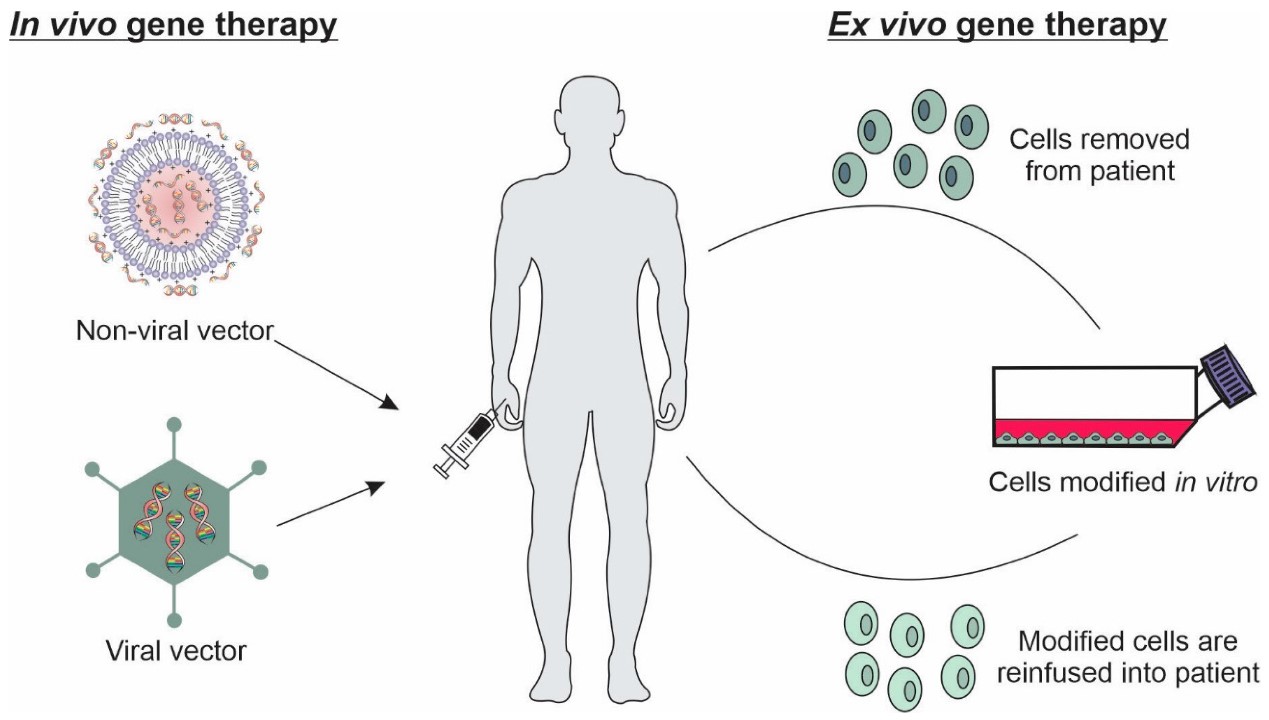Ex vivo administration of liposomes represents a paradigm shift in the management and therapy of diverse illnesses. With the primary objective of selectively driving drug concentrations at targeted tissues, this approach has proven pivotal in enhancing the therapeutic index for several drugs and reducing drug-related toxicity. Liposomes are lipid-based nanoparticles embedded with drugs that can be manipulatively designed to enhance pharmaceutical activity.
 Fig.1 In Vivo and Ex Vivo Techniques Related to Gene Delivery to Target Cells.1,2
Fig.1 In Vivo and Ex Vivo Techniques Related to Gene Delivery to Target Cells.1,2
Mechanistically, the ex vivo administration of liposomes operates by allowing the encapsulation and delivery of diverse therapeutic agents directly to a target area. Liposomes are designed to destabilize and release their encapsulated contents upon induction by specific cues in the microenvironment. Depending on their design, liposomes can be triggered to release their payload by pH variations, temperature changes, or enzymatic actions. Temperature-dependent liposomes, for example, are designed to destabilize and release their payload within hyperthermic regions, often facilitated by the physiological response of tissues to inflammation or disease.
An array of liposomes is utilized in ex vivo administration, each unique in its structure and response to physiological triggers. Conventional liposomes include the first-generation liposomes typified by a simple structure encompassing non-modified phospholipids and cholesterol. Long-circulating liposomes, often classified as second-generation liposomes, come adorned with polyethylene glycol (PEG) on their surface, which reduces their clearance from the body and extends their circulation time. Thermosensitive liposomes unveil a unique design that enables them to release their encapsulated payload at elevated temperatures, a feature particularly beneficial in cancer treatment. All these types are capable of facilitating targeted drug delivery, albeit with varying efficiencies and specificities.
Applications of ex vivo administration of liposomes are vast and varied, spanning several medical fields. In cancer treatment, liposomal drugs have been employed to enhance the effectiveness of chemotherapy while mitigating the associated side effects. By enabling targeted delivery of chemotherapeutic agents, liposomes reduce the amount of the drug reaching healthy tissues, therefore minimizing systemic toxicity. Moreover, ex vivo administration of liposomes has promising applications in gene therapy, where liposomes can be used to deliver corrective genes to patient-derived cells in a controlled environment. Liposomes have also been used in the delivery of vaccines, improving antigen presentation and stimulating a robust immune response.
The benefits of ex vivo administration of liposomes are manifold, with the most notable being improved drug specificity. By encapsulating therapeutics, liposomes ensure that drug delivery is targeted, minimizing the drug's exposure to healthy tissues, which in effect, lessens systemic toxicity. Equally, liposomes can significantly improve the pharmacokinetic profiles of drugs by lengthening their circulation time in the body and enhancing their penetration into tissues. Furthermore, the ex vivo administration of liposomes allows for better control of drug dosing, as the therapeutic administration and dosage can be adjusted depending on the patient's response leading to personalized medical treatment regimes.
The ex vivo administration of liposomes presents a vibrant, forward-looking platform in the healthcare landscape. The future of medicine invariably lies in the strategic incorporation of liposomal therapy.
Creative Biolabs provides custom liposomal services and products. Please feel free to contact us if you have any questions, the liposome expert team will get back to you promptly with professional technical support.
References
 For Research Use Only. Not For Clinical Use
For Research Use Only. Not For Clinical UseSupports
Online Inquiry